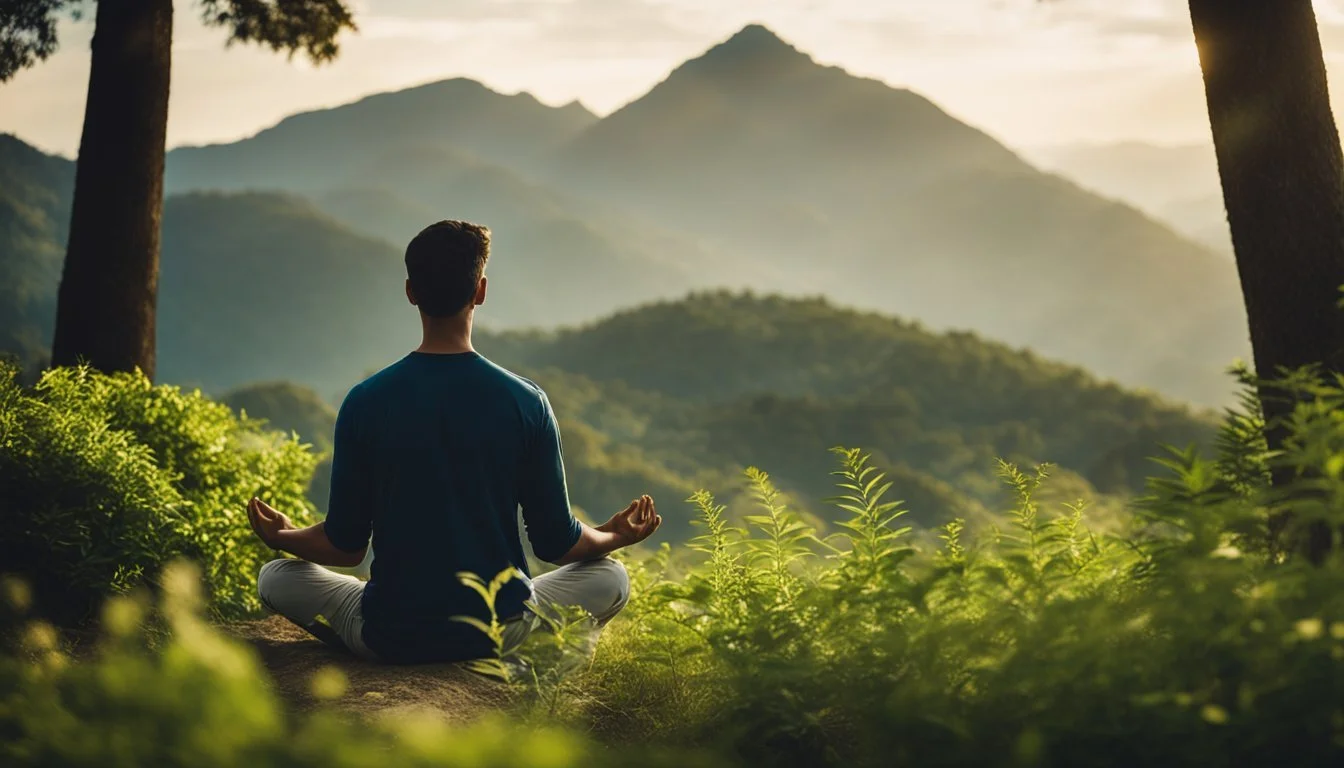5 Films That Showcase Different Meditation Practices
Exploring Mindful Journeys
Meditation is a practice that has gained popularity across the globe, offering unique insights into mental and emotional well-being. Various films provide an engaging exploration of diverse meditation practices, allowing viewers to immerse themselves in spiritual journeys and introspective experiences from different cultures and philosophies.
These films not only educate but also inspire a deeper appreciation for the transformative power of meditation. By showcasing distinct methods and traditions, they offer valuable perspectives on how meditation can influence and enhance everyday life. Through cinematic storytelling, audiences can better understand the significance of integrating mindfulness into their routines.
1) 'Zen' by Jon Kabat-Zinn (2009)
In 2009, Jon Kabat-Zinn's film 'Zen' offers viewers an insightful dive into mindfulness meditation, a practice that emphasizes the cultivation of awareness and presence. Kabat-Zinn, known for his role in popularizing mindfulness in the West, integrates these practices with a Western perspective, making them accessible to a broader audience.
The film serves as both a documentary and instructional guide, using Kabat-Zinn’s expertise to provide practical techniques and guided meditations. Through this medium, 'Zen' explores not only the techniques themselves but also the philosophy underpinning mindfulness meditation. It captures how meditation can be an everyday practice and a path to greater self-awareness.
'Zen' also features interviews with practitioners and experts who share their personal experiences, adding depth and personal context to the practices. This approach not only illustrates the transformative effects of meditation but also demystifies the practice, bridging the gap between ancient traditions and modern applications.
For further information, you can visit 'Zen' on IMDb.
2) 'Walk With Me' - A journey with Thich Nhat Hanh (2017)
"Walk With Me" offers an intimate glimpse into the spiritual life at Plum Village, Thich Nhat Hanh's renowned Zen Buddhist monastery. Directed by Marc J. Francis and Max Pugh, this documentary takes the audience through the daily practices and mindful routines observed by monks and nuns.
The film stands out for its meditative quality, enhanced by Benedict Cumberbatch's narration of Thich Nhat Hanh's teachings. Viewers are invited to explore the profound commitment of the monastic community to mindfulness, living with deep awareness and simplicity in their lives.
Filmed over three years, "Walk With Me" offers a rare look at the monastery's serene landscape and the compassionate journey of those who engage in this way of life. The potential for personal transformation through mindfulness is a central theme explored with subtlety.
This documentary is more than just an exploration of a unique lifestyle; it is an invitation to reflect on one's own life, encouraging the viewer to cultivate mindfulness. The visual storytelling and serene pacing create an immersive experience that echoes the peace and quietude taught by Thich Nhat Hanh.
For more information, visit the IMDb page.
3) 'On Meditation' - A series of intimate portraits
"On Meditation" (2015) is a compelling series of portrait films that explores the deeply personal practice of meditation. It presents first-hand experiences of individuals who have developed meaningful meditation practices. The subjects range from teachers and everyday people to celebrities, offering insights into how meditation shapes their lives.
Among the notable personalities featured is filmmaker David Lynch, known for his commitment to Transcendental Meditation. Lynch shares his journey with meditation and its impact on his creativity and life. His experience highlights the potential of meditation to foster personal growth and well-being.
The series also includes the reflections of the late Peter Matthiessen, a revered writer and Zen practitioner. Matthiessen provides a glimpse into his spiritual practice and how it brought calmness and focus to his everyday life.
Each episode in "On Meditation" delivers a distinct perspective, illustrating the diversity and universality of meditation. The series emphasizes that meditation is both a profound and simple practice, accessible to anyone interested in improving their mental and emotional health.
For more information, visit the IMDb page for "On Meditation".
4) 'Iyengar: The Man, Yoga, and the Student's Journey' (2018)
"Iyengar: The Man, Yoga, and the Student's Journey" provides an insightful look at the life and teachings of B.K.S. Iyengar, a pivotal figure in modern yoga. Directed by Jake Clennell, this documentary explores the profound impact Iyengar has had on global yoga practices. The film begins with a celebration of his 90th birthday and explores his journey from his early life in India.
Iyengar's teachings emphasize alignment and precision, making his form of yoga accessible to a wide range of practitioners. His approach has been described as methodical and deeply spiritual, attracting individuals from various cultural backgrounds. The film captures intimate moments and teachings, showcasing the dedication and unique perspective Iyengar brought to his practice.
This documentary also sheds light on how Iyengar Yoga has been embraced by different cultures, including its integration into religious practices like Catholicism and Islam. It highlights Iyengar's reclusive nature, which adds an element of mystery and intrigue to his persona. The film is a tribute to a yogi whose influence continues to shape modern yoga.
More information about the film can be found on IMDb.
5) 'The Mindfulness Movement' - Spreading awareness (2020)
'The Mindfulness Movement' is a documentary that explores the increasing interest and adoption of mindfulness practices across various communities. Featuring well-known figures like Deepak Chopra and Jewel, the film highlights how mindfulness can play a transformative role in everyday lives.
The documentary not only showcases personal stories but also interviews prominent experts in the field, such as Jon Kabat-Zinn and Sharon Salzberg. These insights provide viewers with a comprehensive understanding of mindfulness as a practical tool for improving mental health and emotional well-being.
In addition to personal narratives, 'The Mindfulness Movement' delves into scientific research that supports mindfulness. The film illustrates how mindfulness practices can reduce stress and promote resilience, making it a valuable resource for individuals seeking to enhance their quality of life.
For more information on 'The Mindfulness Movement', visit IMDb.
The Benefits of Meditation Practices
Meditation practices offer numerous advantages, focusing on enhancing mental well-being, boosting physical health, and fostering spiritual development. Each benefit plays a crucial role in improving the overall quality of life through regular practice.
Mental Health Benefits
Meditation is renowned for its ability to alleviate stress and anxiety. Techniques such as mindfulness meditation help individuals observe thoughts and feelings without judgment, which can lead to reduced stress levels. Studies show that regular practice enhances emotional regulation, promoting a calmer state of mind.
Additionally, meditation supports cognitive functions, improving concentration and memory. Mindfulness and mantra-based practices strengthen the brain's attention and memory capabilities. This cognitive boost can lead to greater productivity and clearer thinking in daily activities.
Physical Health Benefits
Meditative practices contribute significantly to physical well-being. By lowering stress, meditation can reduce the risk of heart disease and lower blood pressure. The state of relaxation achieved through meditation releases tension in the body, promoting better cardiovascular health.
Moreover, meditation aids in pain management. Techniques that focus on visualization and deep breathing can reduce the perception of pain and improve physical resilience. This offers a drug-free method to manage chronic pain conditions effectively.
Spiritual Growth
Spiritual growth is a profound aspect of meditation. For many, meditation serves as a pathway to deeper self-awareness and connection with one's inner self. Practices like transcendental meditation guide individuals to explore their consciousness, seeking greater meaning and purpose in life.
Through consistent practice, individuals often experience heightened intuition and clarity of thought. This growth can cultivate a sense of belonging and connection to the universe, enhancing one's sense of peace and fulfillment. Regular meditation encourages a journey of exploration beyond the immediate physical world.
Cultural Influences on Meditation
Meditation practices have been shaped by a variety of cultural factors across the world. Eastern philosophies deeply rooted in ancient traditions have hugely impacted their development. Meanwhile, Western cultures have adapted these practices, often integrating scientific insights.
Eastern Philosophies
In many Eastern cultures, meditation is intertwined with spiritual and philosophical systems such as Buddhism, Hinduism, and Taoism. These traditions emphasize self-awareness and enlightenment. Mindfulness meditation, originating from Buddhism, encourages practitioners to be present in the moment, often focusing on breathing.
In Hinduism, techniques like Transcendental Meditation involve using mantras to reach higher states of awareness. Taoist approaches often combine meditation with physical exercises, like tai chi, highlighting harmony within the self and world. Each practice reflects the intrinsic cultural values of harmony, discipline, and spiritual growth found in these societies.
Western Adaptations
Western cultures have embraced and transformed meditation, often emphasizing pragmatic and psychological benefits. Scientific research has played a crucial role in adapting these practices for stress reduction, mental health, and productivity. Mindfulness-Based Stress Reduction (MBSR) is a prominent program that blends mindfulness practices with therapeutic techniques.
While traditional practices focus on spiritual goals, Western adaptations often aim for psychological well-being and emotional stability. Techniques used in schools, corporate settings, and therapy have been modified for accessibility, focusing on simplicity and inclusivity. Western adaptations demonstrate how cultural contexts can reshape ancient practices to meet contemporary needs.





